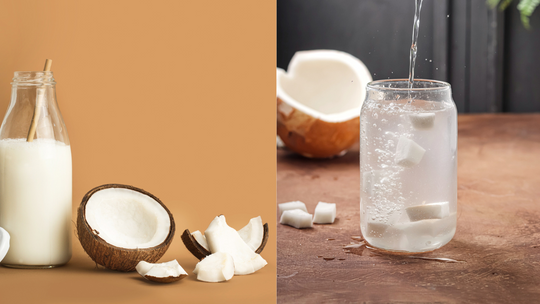Coconut Milk vs. Coconut Water: Unraveling the Coconut Confusion
Posted on October 30 2023,

The Basics: What are Coconut Milk and Coconut Water?
Coconut milk and coconut water are both extracted from coconuts, but they come from different parts of the fruit.
Coconut Water:
- Source: Coconut water is the clear liquid found inside young, green coconuts.
- Flavor: It has a mild, slightly sweet taste with a hint of coconut flavor.
- Nutritional Content: Coconut water is low in calories and is naturally rich in electrolytes like potassium and magnesium.
- Use: It's a popular choice for hydration and is often consumed as a refreshing beverage.
- Source: Coconut milk is made by blending a mature coconut's white, meaty flesh with water.
- Flavor: It has a rich, creamy texture and a strong coconut flavor.
- Nutritional Content: Coconut milk is higher in calories and healthy fats, making it a suitable dairy milk substitute for cooking and baking.
- Use: It's a staple in many Asian and tropical cuisines and is used in both sweet and savory dishes.
Texture and Appearance
The most apparent difference between the two is their texture and appearance. Coconut water is a clear, thin liquid, similar to water, whereas coconut milk is thick, creamy, and white, resembling cow's milk. The texture of coconut milk is essential for creating rich curries, creamy soups, and decadent desserts.
Nutritional Profile
Coconut milk and coconut water offer distinct nutritional benefits:
Coconut Water:
- Low in calories.
- High in electrolytes, especially potassium, which is excellent for hydration.
- Contains no fat, making it a healthier option for those looking to cut down on fats.
- Higher in calories due to its fat content.
- Contains saturated fats, but also healthy fats that can benefit heart health.
- Rich in vitamins and minerals, including manganese, copper, and iron.
Culinary Uses
Coconut milk and coconut water serve different purposes in the kitchen:
Coconut Water:
- A natural hydrating beverage.
- Often used in smoothies and cocktails for added flavor and electrolyte boost.
- Acts as a base for light and refreshing soups and stews in some cuisines.
Coconut Milk:
- A versatile ingredient in cooking.
- Commonly used in curries, sauces, and soups, lending a creamy texture and rich coconut flavor.
- A key ingredient in many tropical desserts like coconut rice pudding or coconut flan.
Health Considerations
Both coconut milk and coconut water have been praised for their health benefits, but it's important to be mindful of your dietary requirements:
- Coconut water is a great choice for those seeking hydration and electrolyte replenishment.
- Coconut milk, while nutritious, should be consumed in moderation due to its higher calorie and fat content.
In summary, coconut milk and coconut water may share the same source, but they are entirely distinct when it comes to flavor, texture, culinary uses, and nutritional profiles. Coconut water is your go-to thirst quencher with added electrolyte benefits, while coconut milk brings creamy richness to your savory and sweet dishes. Knowing these differences will help you make the right choice when it comes to cooking, baking, or simply quenching your thirst with coconut-based products. So, whether you're in the mood for a tropical drink or whipping up a coconut curry, understanding the distinction between these two coconut derivatives is key to elevating your culinary game!
